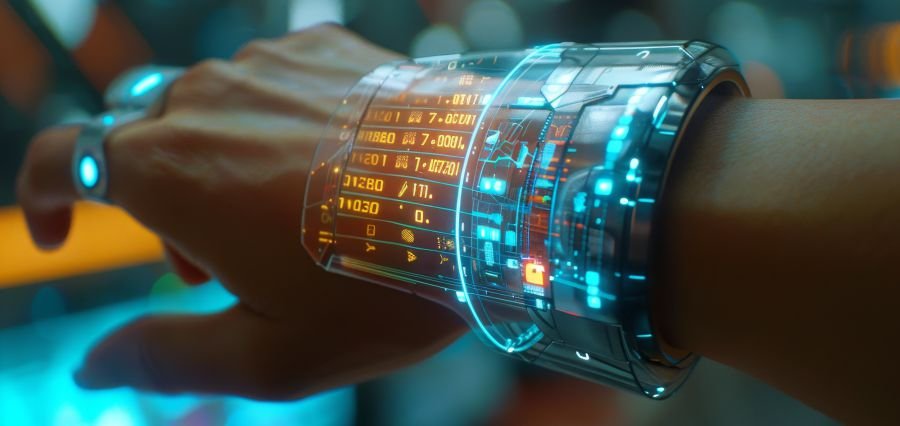Wearable Technology
In recent years, wearable technology has revolutionized healthcare by providing instant access to real-time health data. These innovative devices have evolved from simple step counters to sophisticated gadgets capable of monitoring a wide range of vital signs and health metrics. As we delve into the world of wearable health tech, we’ll explore its evolution, applications, and the profound impact it’s having on patient care and outcomes.
From Pedometers to Smart Health Companions
The journey of wearable health devices began with basic pedometers, but today’s technology offers far more advanced capabilities. Modern wearables can track heart rates, analyze sleep patterns, measure physical activity, and even monitor blood glucose levels without invasive procedures. This leap in functionality has been driven by rapid advancements in sensor technology, miniaturization, and the integration of artificial intelligence (AI) and machine learning algorithms.
These smart devices now serve as personal health assistants, providing users with immediate feedback and actionable insights into their well-being. The incorporation of AI enables these gadgets to go beyond mere data collection; they can now offer predictive analytics, potentially identifying health risks before they manifest as serious conditions.
Continuous Health Monitoring: A Game-Changer
One of the most significant advantages of wearable health technology is its ability to facilitate ongoing, real-time health monitoring. This feature is particularly valuable for individuals managing chronic conditions, as it allows healthcare providers to remotely track vital signs and other important health metrics.
For example, some smartwatches can now detect irregular heart rhythms, including atrial fibrillation, with impressive accuracy. This capability enables timely medical interventions that could prove life-saving. Similarly, non-invasive glucose monitoring devices represent a major breakthrough in diabetes management, offering a more comfortable alternative to traditional blood sugar testing methods.
Enhancing Patient Outcomes Through Data-Driven Care
Incorporating wearable technology into healthcare systems has shown promising results. By providing healthcare professionals with access to real-time data, these devices facilitate more informed decision-making and allow for timely interventions.
Research suggests that incorporating data from wearable devices into electronic health records (EHRs) can significantly enhance patient engagement and overall health management, particularly for those with chronic conditions. This data-driven approach not only improves the accuracy and comprehensiveness of health records but also reduces the administrative burden on healthcare providers, allowing them to focus more on delivering effective care.
Empowering Patients in Their Health Journey
Perhaps one of the most transformative aspects of wearable health technology is its ability to empower patients to take an active role in managing their health. By providing users with easy access to their health metrics, these devices enable individuals to make more informed lifestyle choices.
Studies have shown that people who use wearable activity trackers tend to be significantly more physically active compared to those who don’t. This increased activity is associated with a reduced risk of chronic illnesses such as heart disease and diabetes. The immediate feedback provided by these devices serves as a powerful motivator, encouraging users to make healthier choices in their daily lives.
Navigating Challenges in Wearable Health Tech Adoption
While the potential benefits of wearable health technology are substantial, its widespread adoption faces several challenges. Security and privacy of data are among the most pressing concerns. As these devices collect and transmit sensitive personal health information, ensuring this data remains protected from unauthorized access is paramount.
Another challenge lies in maintaining user engagement over time. While many people are initially enthusiastic about using wearable health devices, sustaining this engagement can be difficult. Factors such as technical issues, comfort, and the need for ongoing support from healthcare professionals can impact long-term use.
Additionally, there’s a need for standardization in data collection and interpretation across different devices and platforms. This standardization would facilitate better integration of wearable health data into existing healthcare systems and ensure more consistent and reliable health insights.
The Future of Wearable Health Technology
As technology continues to advance, the potential applications for wearable health devices are expanding. Future developments may include more sophisticated biosensors capable of detecting a wider range of health markers, improved AI algorithms for more accurate predictive analytics, and enhanced integration with telehealth services.
There’s also growing interest in developing wearable devices that can administer medications or provide therapeutic interventions. For instance, researchers are exploring wearable insulin delivery systems for diabetes management and devices that can deliver targeted electrical stimulation for pain relief or neurological disorders.
Conclusion
Wearable health technology represents a significant leap forward in healthcare delivery and personal health management. By providing real-time health data and insights, these devices are empowering individuals to take control of their well-being and enabling healthcare providers to deliver more personalized and proactive care.
As we look to the future, the continued evolution of wearable health tech promises to further transform the healthcare landscape. By addressing current challenges and focusing on enhancing user experience and data integration, these devices have the potential to play an increasingly vital role in improving health outcomes and quality of life for people around the world.
The journey of wearable health technology is just beginning, and its full potential is yet to be realized. As innovation continues and adoption grows, we can expect these smart health companions to become an indispensable part of modern healthcare, ushering in an era of more connected, informed, and personalized health management.
Read More: Click Here




